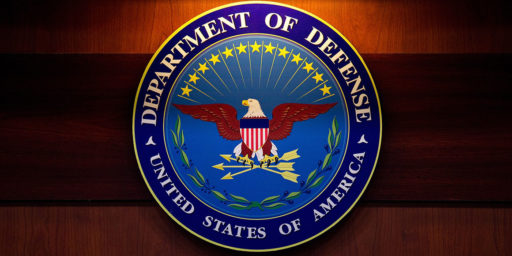Why Oh Why Can’t We Have a Better Press Corps?
NPR had an insightful piece on Major General Mark P. Hertling on “Morning Edition” today. He’s preparing his unit for deployment to Iraq and his oldest son is there on his third tour. His youngest son is at West Point and figures to go, too, if the war is still ongoing. It was a fair and sympathetic treatment.
One small problem: Hertling’s unit was twice referred to by the host as the 1st Army Division.





As a casual observation, James, you appear to be answered your own question, in the first three letters of your post.
Wow. That’s pretty substantive criticism there.
That’s a rather basic point, no? That they don’t know what an armored division is?
A rather basic point that in no way changes the actual point of the story. I think we should reserve our criticisms for when mistakes actually change the information the story is trying to get across.
This isn’t a case of spinning the facts or ignoring key evidence or being completely disconnected from reality, this is a host who can’t remember that it’s an armored division not an army division. It’s like saying we need a better press corps because the host was mispronouncing someone’s name.
I don’t know, James. If it was the DoD correspondent or something, maybe I’d care. I listened to the same report and didn’t even notice.
Sorry, but I don’t see what the big deal is either. You can report informatively on the Army without knowing the ins and outs of the org chart. The fact that this thread even exists seems to show that anyone who actually cares about a slip like that probably caught it anyway.
This is the best criticism you can come up with for today’s press corps? How about the hundreds of times that television talking heads have repeated the falsehood about Iraq’s weapons of mass destruction? That might have had a slightly more significant impact upon the quality of the public debate than some ignorance about the organization of the Army.
What about when the MSNBC morning anchor said Jerry Falwell was Bush’s chief foreign policy advisor?
I can think of 100 gaffes that are better than this one. You just like to pick on NPR.
Why should a reporter or newsreader need to know who they are, what they are properly called, how they are organized, what their capabilities are, or what their mission is in order to pass judgment on their tactics, strategy and performance when they know that they are miserable failures, racists, torturers and killers serving a bungling imperialist master? Being factually correct is less important than conveying the TRUTH.
I’m thinking of a plumber who’s outraged when a reporter mistakes a seat wrench with a basin wrench.
No. This is a rather fundamental difference. We’re talking about the functions of the unit, and the lack of understanding thereof, on the people charged to report such matters to us.
It’s rather like a resume, listing your former as a plumber’s helper, versus an assistant plumber. Both useful, but hardly for the same purpose.
Such a mistake, to my thinking, clearly indicates a lack of understanding of what they are supposed to be explaining to their readers. That lack of understanding does nothing to counteract the anti and military image that the news media in general, and NPR particularly, have had for decazdes, now.
Swank:
Jinx!
I didn’t hear the report, but from James’ summary, it didn’t seem like the host was explaining the functions of the unit, but rather a more personal interview about a soldier’s family and experiences in the war.
If calling his unit the wrong name changed the message of the interview in any way, James didn’t mention it. Call it a mountain all you want, to me it just looks like a mole hill.
charles: I’m pretty sure the NPR host didn’t accuse his guest of any of those things, so your post is kind of pointless here. Maybe you should take it somewhere else?
You’ve never misspoken when you’re talking? It would be mildly substantive if they wrote it, but I know what an Armored Division is, and might still say Army division occasionally if I was having a conversation. It’s just ironic because you’re taking the headline from Brad DeLong, who tends to use it for extremely substantive criticism, putting you in an unfavorable comparison.
More to the point, it leads to the kind of sloppy non-thinking that charles austin displays, You yourself said the report was insightful, but they misspoke, so the troglodytes read that as “OMFG teh NPR hates the troopz!”
I don’t see any evidence that NPR doesn’t hate the troops.
I’m pretty sure I didn’t accuse NPR or this reporter of what some other commenters think I accused them of. I posed a rhetorical question, not an accusation per se, and certainly one that was general rather than specific vis-a-vis this post. I apologize for the clumsiness of the wording or the nuance implied with the use of a question mark, since the snark wasn’t perhaps as obvious as I thought.
James is merely harping on a recurring theme, that capital J journalists continually remind us of the levels of editing and fact checking that goes into professional journalism, and yet they seem to have a lot of trouble with basic facts whenever it comes to reporting on the military. Others have noted before that captial J journalists these days have so little actual experience and exposure to the military that they tend to fall back on what they think they know, which are usually just prejudices, urban myths, and occasionally ideological moonbattery.
I hope this helps.
Nor do I.
All of which were doubtlessly and relentlessly negative. In any event, the title of the unit is the function of the unit. It’s not called “Jack’s guys in green” for a reason. Misnaming them, thereby, shows a lack of understanding of their function.
And even assuming this is a slip-up… they’ve got far too long a history on this kind of thing, too much in the way of credibility issues, to not at least have the question raised each time they do it.
It shows a disregard of the basics—get the names, dates, places and affiliations correct.
Exactly what jim said at 04:23. If you’re going to play journalist, then you need to know what the hell you’re talking about when you file a report.
Errors of basic fact suggest that the reporter does not, in fact, have the basics down tight.
Is it a mere slip of the tongue? Sure, that’s possible. But given the track record of NPR reporting on things military, ignorance is the more likely excuse.
So, the truth doesn’t involve the facts, say you.
Got it.
The cognitive dissonance exhibited in this comment of yours, gives as good an object lesson is humanity will ever find as to the nature of western liberalism today.
Bloody well amazing.
Uh, Bithead, I think you misread me. This satire and sarcasm stuff is a lot harder than I thought.
No fault to you. Except perhaps, you made it too realistic.
(Smile)